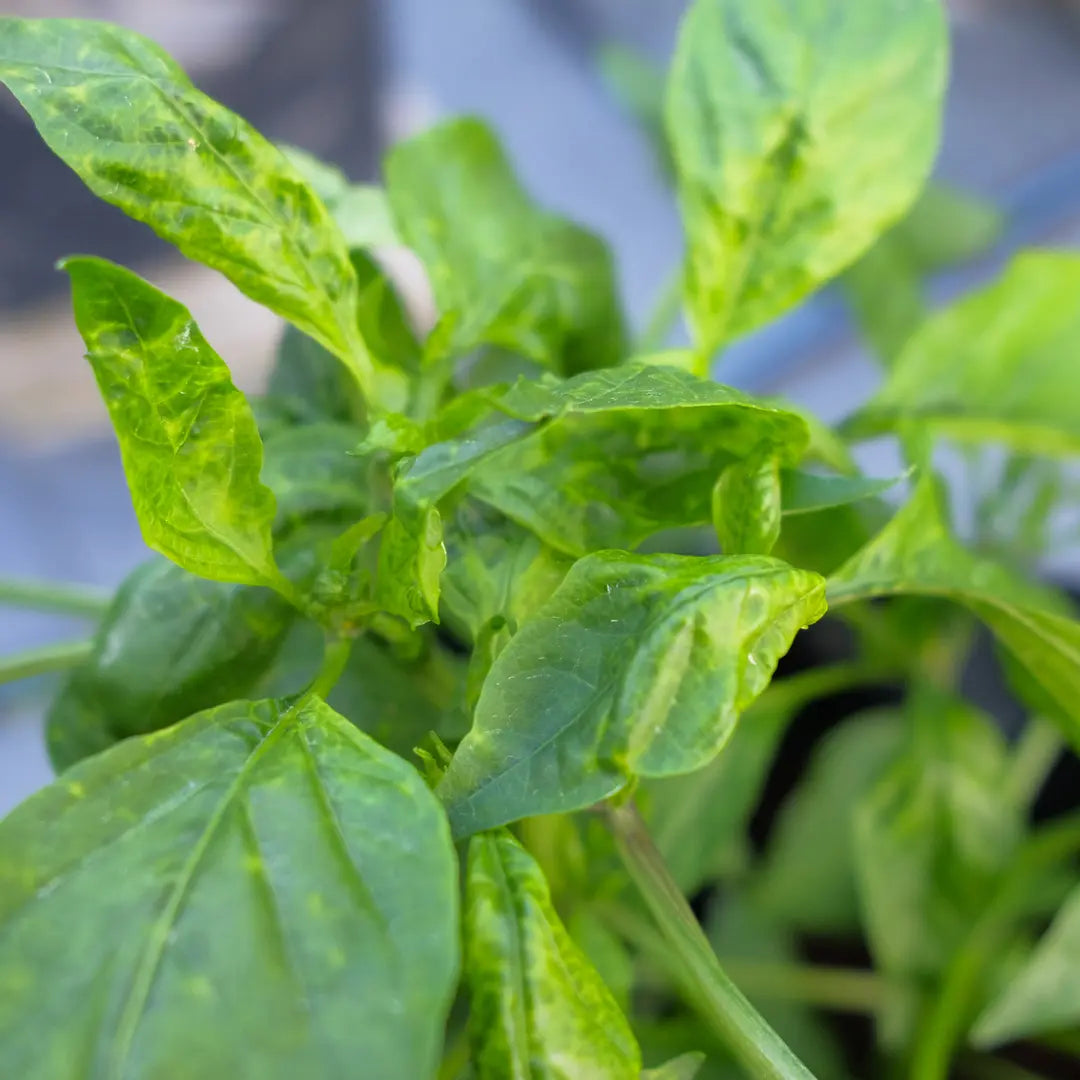
Mosaic Virus
At Ignition Seeds, we understand the importance of nurturing your chilli plants to ensure a bountiful harvest. One of the challenges you might face in your chilli gardening journey is the Mosaic Virus, a common disease affecting chilli plants worldwide. In this comprehensive guide, we'll help you identify, understand, and manage this disease effectively. With careful attention to identification, symptoms, and prevention and management strategies, you can protect your chilli plants from this damaging virus.
Collapsible content
Identification
The Mosaic Virus is a group of plant viruses that affect a wide range of crops, including chilli plants. It is named for the mosaic-like pattern it creates on the leaves of the infected plants. Identifying the virus early is crucial to mitigating its impact on your chilli plants.
The virus primarily spreads through insects like aphids, which transmit the virus when feeding on infected plants. Additionally, the virus can be spread through contaminated tools, hands, and even seeds. Keep an eye out for any signs of infestation, as early detection is key to successful management.
Symptoms
The symptoms of the Mosaic Virus in chilli plants can vary depending on the specific strain of the virus, the age of the plant, and the environmental conditions. However, there are several common symptoms you should be aware of:
- Mottled Leaves: One of the most distinctive signs of the Mosaic Virus is the appearance of a mosaic-like pattern on the leaves. The leaves may display a mix of yellow, light green, and dark green patches, giving the foliage a mottled appearance.
- Leaf Distortion: Infected plants may exhibit distorted or twisted leaves. The leaves might curl upwards, become narrow, or develop an irregular shape.
- Stunted Growth: Chilli plants affected by the Mosaic Virus often display stunted growth. The plants may not grow to their full potential and may produce fewer and smaller fruits than healthy plants.
- Necrosis: In severe cases, the virus can cause necrosis, leading to the death of plant tissue. This may result in the leaves turning brown, wilting, and eventually falling off.
- Reduced Yield: Infected plants usually produce fewer and smaller fruits, impacting the overall yield of your chilli plants.
Prevention and Management
To protect your chilli plants from the Mosaic Virus, it is essential to implement preventive measures and adopt proper management practices. Here are some effective strategies to help you safeguard your chilli plants:
- Choose Resistant Varieties: When selecting chilli seeds, opt for virus-resistant varieties to reduce the likelihood of infection. At Ignition Seeds, we offer a range of chilli seeds with natural resistance to the Mosaic Virus.
- Inspect Seeds and Seedlings: Carefully inspect seeds and seedlings for any signs of infection before planting. It is crucial to start with healthy plants to minimise the risk of introducing the virus into your garden.
- Practice Crop Rotation: To prevent the build-up of virus-carrying insects in the soil, practice crop rotation by changing the location of your chilli plants each growing season.
- Control Insect Pests: Regularly monitor your plants for the presence of aphids and other pests that can transmit the virus. Implement natural or chemical control methods to keep the insect population in check.
- Maintain Proper Hygiene: Sanitise gardening tools, gloves, and footwear to prevent the spread of the virus. Wash your hands before and after handling plants, especially if you suspect infection.
- Remove Infected Plants: If you identify a plant with Mosaic Virus symptoms, remove it immediately to prevent the virus from spreading. Dispose of infected plants by burning or sealing them in a plastic bag before placing them in the rubbish bin. Do not compost infected plants, as the virus can survive in plant debris.
- Provide Adequate Spacing: Ensure your chilli plants have ample space between them to promote air circulation and reduce the chances of disease spreading. Proper spacing also makes it more difficult for pests to move between plants.
- Manage Weeds: Weeds can serve as alternate hosts for the Mosaic Virus and pests that transmit it. Regularly remove weeds from your garden to reduce the risk of infection.
- Apply Reflective Mulch: Using reflective mulch, like silver-coloured plastic, around your chilli plants can deter aphids and other pests. The reflective surface confuses insects and makes it difficult for them to locate your plants.
- Monitor and Adapt: Regularly inspect your chilli plants for any signs of the Mosaic Virus and take immediate action if you notice symptoms. Stay informed about the latest prevention and management strategies to keep your plants healthy and productive.
In conclusion, while the Mosaic Virus can be a serious threat to your chilli plants, careful planning and diligent management can help you prevent and control this disease. By following the strategies outlined in this guide, you can safeguard your chilli plants from the Mosaic Virus and enjoy a bountiful harvest. Remember, early detection and intervention are crucial to successfully managing this disease, so remain vigilant and attentive to your plants' needs. At Ignition Seeds, we are committed to providing you with the resources and support you need for successful chilli gardening in New Zealand.
